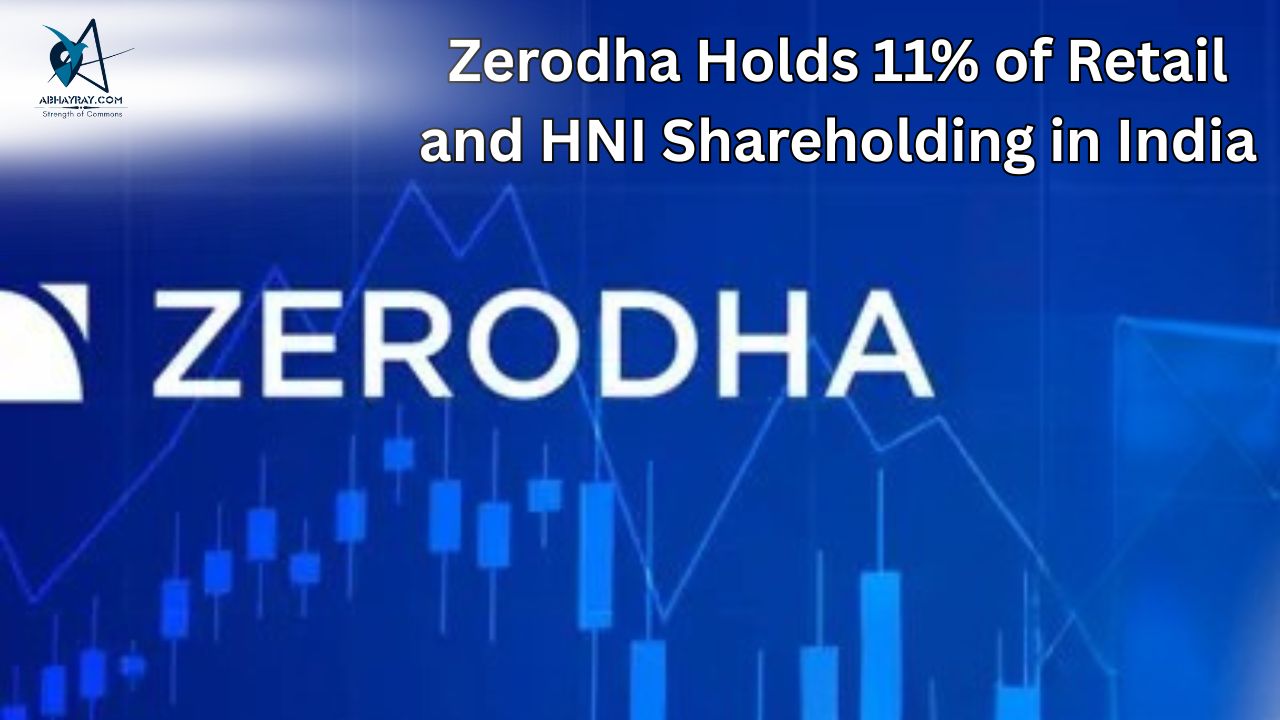Introduction
Nearly 11% of all retail and high-net-worth individual (HNI) shareholding in India is now held in Zerodha demat accounts, according to company co-founder and CEO Nithin Kamath. “~11% of all retail and HNI holdings are in @zerodhaonline demat accounts. Grateful for the incredible trust our customers place in us,” Kamath posted on microblogging platform X (formerly Twitter) on Friday, alongside a chart showing Zerodha’s sharp rise in market share since 2018.
Zerodha’s Growing Market Presence
Zerodha has established itself as a dominant force in India’s retail brokerage sector, now holding nearly 11% of all retail and HNI shareholdings across the country. This remarkable market share was revealed by co-founder and CEO Nithin Kamath, who shared the data on X (formerly Twitter), highlighting the company’s consistent growth since 2018. What began as a bootstrapped startup has transformed into one of India’s most trusted trading platforms, thanks to its low-cost, technology-driven model. Zerodha’s user-friendly interface, transparency, and zero-commission equity delivery have attracted millions of retail investors. The company’s digital-first approach and focus on investor education have also played a major role in strengthening its presence. As the second-largest broker by active client base, Zerodha continues to gain investor trust, positioning itself as a go-to platform for both new and experienced traders in India’s evolving financial market. Its success reflects a broader shift toward digital investment solutions in the country.
Staying Private, Thinking Big
Despite growing scale and profitability, Kamath has ruled out plans for an initial public offering. “We continue to believe there’s no reason to IPO. Being listed on exchanges is tough for a company like us,” he said in an interview with CNBC-TV18. Zerodha will remain privately held for the foreseeable future.
“Given the profitability of the last three years, our net worth is almost 40% of the customer funds that we manage. It makes us one of the safest brokers to trade with,” Kamath said earlier this week.
Looking ahead, Zerodha plans to evolve into a broader financial services group. Kamath said the firm’s long-term roadmap includes becoming a diversified financial conglomerate, with plans to eventually enter the banking sector subject to regulatory approval for a licence. Launched as a bootstrapped startup, Zerodha carved out space in India’s brokerage industry with its low-cost trading model and digital-first approach. It is now the country’s second-largest broker by active client base.
Strong Financials and Steady Growth
Zerodha has cemented its position as one of India’s most financially robust brokerage firms. In FY24, the company reported a 62% surge in profit, reaching ₹4,700 crore, alongside a 21% increase in revenue to ₹8,320 crore. It also holds ₹1,000 crore in unrealised gains, showcasing strong investment performance. Despite industry-wide fluctuations, Zerodha has consistently maintained steady growth without raising brokerage fees or relying on outside funding.
The company’s net worth now stands at nearly 40% of the total customer funds it manages, reinforcing its reputation as a secure and trustworthy broker. Even with co-founder Nithin Kamath forecasting a 10–20% slowdown in activity in early FY26 due to weaker market trends, Zerodha is optimistic about achieving its ₹10,000 crore revenue target by year-end. Its solid financial footing and cautious, sustainable approach to growth have made it a standout in India’s evolving fintech and investment landscape.
Projected Slowdown, Yet High Targets
Despite a projected 10–20% slowdown in trading activity during Q1 FY26 due to weaker market sentiment, Zerodha remains optimistic about its overall performance. CEO Nithin Kamath has expressed confidence in achieving a revenue target of ₹10,000 crore by the end of the fiscal year—without increasing brokerage fees. This goal reflects the company’s strong foundation, efficient cost structure, and loyal customer base. Zerodha’s digital-first model and continued expansion into financial services, including its rapidly growing AMC division, support this optimistic outlook. Even in the face of market headwinds, the firm’s strategy focuses on sustainable, long-term growth rather than short-term gains.
Zerodha AMC’s Rapid Growth
In another post on X, Kamath mentioned that Zerodha Asset Management Company (AMC) crossed ₹6,400 crore in assets under management (AUM) just 18 months after launch.
A major contributor to this growth is the LIQUIDCASE ETF, which has amassed ₹4,700 crore in AUM within just 15 months, making it one of India’s most successful retail ETF rollouts. Kamath called the LIQUIDCASE ETF their “Hero Fund,” highlighting its sharp rise from ₹843 crore in April 2024 to ₹4,700 crore. The fund’s rapid growth reflects its strong traction among retail investors and solidifies Zerodha AMC’s presence in the ETF market.
Conclusion
Zerodha has emerged as a dominant force in India’s financial sector, holding nearly 11% of all retail and HNI shareholdings. This bootstrapped startup’s success stems from its low-cost, technology-driven model, making it the second-largest broker by active client base. Despite impressive profitability (₹4,700 crore profit in FY24), Zerodha prioritizes private ownership, with plans to diversify into a broader financial services group, including banking. Its rapidly growing AMC, particularly the LIQUIDCASE ETF, further underscores its market impact. While anticipating a near-term slowdown, Zerodha remains optimistic about achieving a ₹10,000 crore revenue target, highlighting its strong foundation and sustainable growth strategy in India’s evolving financial landscape.
GMICapitals.com RaysVeda.com GetMyStartup.com LawCanal.com GetMyIndia.com ZinCob.com Angeltors.com

